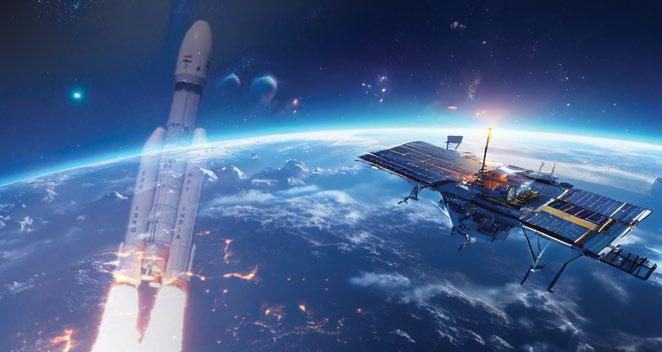
The Government of India’s recent approval of key upcoming missions for the Indian Space Research Organisation (ISRO) marks a significant step in solidifying the nation’s growing presence in global geopolitics. The decision, involving a total investment of USD 2.7 billion (Rs 22,750 crore), highlights the country’s commitment to advancing its space capabilities.
This development had been anticipated for some time. The September issue of Voice&Data provided an in-depth analysis of ISRO’s upcoming missions and their potential impact. With the formal approval of the Union Cabinet on 18 September, these missions have gained even greater importance in light of the current global and national geopolitical landscape.
SPACE MISSIONS AT A GLANCE
India’s major space endeavours can be divided into four main areas: the moon mission—Chandrayaan, the space station project—Bharatiya Antariksha Station, the Next Generation Launch Vehicle (NGLV) rocket, and the manned space mission—Gaganyaan.
Each of these missions is expected to play a crucial role in amplifying India’s achievements in space exploration. India is building on a legacy that includes the 2013 Mars Orbiter Mission (Mangalyaan), which made history as the world’s most affordable interplanetary mission. Compared to the USD 671 million (Rs 5,600 crore) spent by NASA on a similar mission, ISRO’s Mangalyaan cost a mere USD 53 million (Rs 450 crore), based on current exchange rates.
Mangalyaan was not only significant for India’s own space exploration efforts but also demonstrated to the world the possibility of conducting cost-effective space research. The mission underscored India’s ability to contribute to global understanding of space, science, and the search for life beyond Earth.
This story is from the October 2024 edition of Voice and Data.
Start your 7-day Magzter GOLD free trial to access thousands of curated premium stories, and 9,000+ magazines and newspapers.
Already a subscriber ? Sign In
This story is from the October 2024 edition of Voice and Data.
Start your 7-day Magzter GOLD free trial to access thousands of curated premium stories, and 9,000+ magazines and newspapers.
Already a subscriber? Sign In

Data discomfort: Why India's data connectivity speeds are falling
India is one of the world’s biggest markets for 5G Internet services, but that has come at the cost of connectivity speed—at least for now

A full-stack mission to orbit
With its all-in-one model, Dhruva Space is merging satellite design, launch, and support under one roof to streamline India's space-tech future

5G dreams: A tech revolution hits roadblocks
India's swift 5G rollout encounters hurdles as operators struggle to monetise their investment, with sluggish consumer and enterprise adoption stalling growth

Empowering India's next-gen business pathways
Cloud, data centres, and 5G form a powerful trio, shaping India’s digital future with scalable infrastructure, seamless connectivity, and rapid innovation

Interconnected technologies, unlocking enterprise growth potential
The synergy of AI, IoT, and 5G is transforming business operations, enabling smarter decision-making and paving the way for scalable, data-driven growth

Beyond the 5G horizon, a new era of user expectations
Telecom experts explore a future beyond 5G, revealing how Al, loT, and secure infrastructure will transform industries and meet rising user demands

Unfolding India’s digital journey beyond 5G
India’s telecom leaders envision a future of next-gen connectivity, aiming for a digitally inclusive landscape driven by innovation and sustainable growth

Digital infrastructure: not the Achilles' heel but the jugular
As cyber threats intensify, digital infrastructure faces rising risks, demanding vigilant, multi-layered defences to ensure resilience for the future.

BUILDING SMARTER HIGHWAYS IN TELECOM'S NEW DIGITAL FRONTIER
Autonomous networks enable telcos to streamline operations, enhance services, and reduce costs, driving efficiency in a data-driven, hyperconnected world

Pre-zero data dreams: Are AI smartphones leading the way?
Artificial Intelligence can unlock personalised insights, ushering in a new era of data-driven experiences that anticipate user needs before they are expressed.